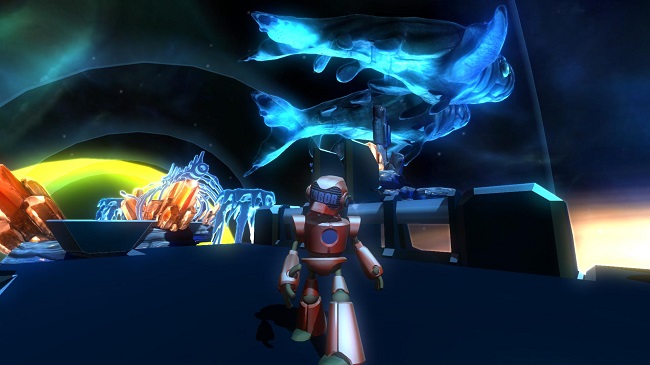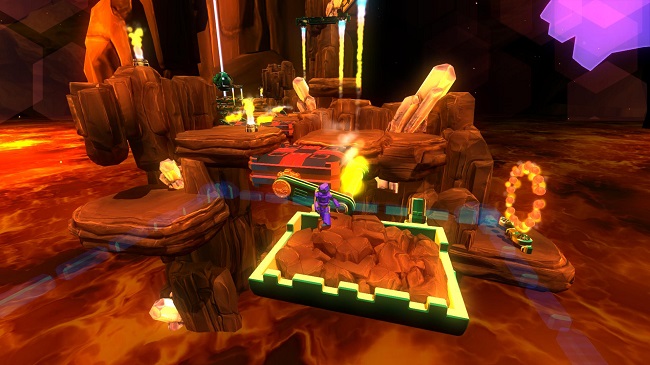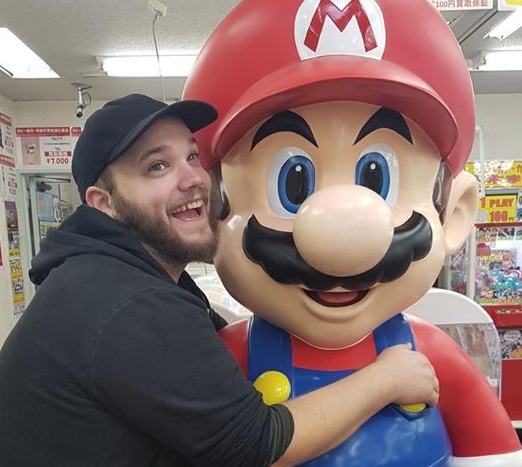
Rogue Singularity seems like the kind of game that I could get really into: A platformer with procedurally generated levels, giant death-trap machines, and an emphasis on fast playthroughs. Before speaking with developer Scott Beca, I made many frustrated and profanity-strewn attempts to beat my personal times. I could feel myself getting into the groove of the gameplay despite the noise and distraction of the convention around me, and that alone was impressive. After being finally dragged away by Nick, Scott was kind enough to spare a few minutes to take me through what the game is about and where he’s taking things.

“ERROR! ERROR! MY CREATOR IS TRYING TO KILL ME!”
What can you tell us about Rogue Singularity?
Rogue Singularity is an infinite, high-speed obstacle course, it’s a 3D procedurally generated platformer set in space on a destroyed world that’s been sucked into a black hole. You’re a robot and it’s you against the level, the level is trying to kill you and you’re trying to survive and make it to the end.
So by procedurally generated, you mean every level is just randomly constructed?
Yeah, we’ve got a number of algorithms that means every level you play will be different. There’s a number of zones that have their own pieces, but they’re constructed in different ways every time you play.
So is there a continuous story that follows these zones?
The story is very minimalistic; you’re a robot that’s been created for the single purpose of besting the hardest challenge in the universe, which is to make it into a black hole intact. Your creator is egging you on and is he a friend or a foe? That’s a mystery which is unveiled as you journey through the black hole.

“There’s a number of zones that have their own pieces, but they’re constructed in different ways every time you play.”
I’ve been getting some Super Mario Galaxy vibes while playing, was that an inspiration and were there any other influences?
Super Mario Galaxy was definitely an inspiration, like with the space theme, and the shifting blocks in space as obstacles though we don’t really do anything with the gravity. We’ve taken a lot of influence from earlier Mario games, as well, especially Mario 64. Other inspirations are games like Spelunky and Super Meat Boy, which are super hard, played by speed runners – super difficult but really rewarding.
So you’re trying to aim for the sort of audience that’s into speed running and competitive play?
Yeah, definitely. When most people start out, they’ll likely start out slow and just try to master the game. Once you get into the flow and get used to the controls, it feels pretty natural to just say “Okay, now I know how to play but I wanna go fast and do it better!” That’s a big aspect for us, everything we build we try not to slow the player down. We want them to be able to keep going and get into like a “flow state.”
How long has the game been in development for?
It’s been in development for a year and a half now, and it’s in an alpha state, we’re currently going for Greenlight to get it into more of an open-beta testing stage, and invite people from Steam to test it. We’re aiming for a release date next year, hopefully around June-July.
What sort of content is going to be added between now and then?
Quite a lot actually – we’re currently showing three zones, but we want to have five zones by the end. We are adding character customization – both cosmetics and ability customization. When you start the game you’ll be able to choose, “Do I want a double jump or a single jump and I can go faster,” or maybe equip yourself with a grapple that lets you shoot yourself back up to the level if you fall. We feel like you should be able to customise the way it plays as well as the way it looks.
What are the three zones that you’ve got at the moment?
The first zone is kind of a metallic city with robots that’s been torn apart. The second zone is kind of a weird one that we’re still working on; it’s like jungles and asteroids and logging in space. The last zone is you being inside pieces of a ruined planet and there’s lava below you. The biggest differences beyond the visuals and the different pieces are that each one has a kind of theme about the obstacles used. The first zone is all about lasers; they’re easier to dodge but they’ve also got a wider area of effect, and there’re lots of them. The second zone has lots of saw blades and things that’ll hit you around; the third zone has lots of lava, and so there’s lots of fireballs and that sort of thing. They’re really influenced by the environments’ visual designs.

“It’s been so great seeing people who’ve come back again to see the game and tell us about all the stuff that’s changed and be like ‘Wow! This is amazing!'”
What’s your experience been like at PAX?
PAX has been great; we’ve been here for the last two games showing off this game and other games. It’s been so great seeing people who’ve come back again to see the game and tell us about all the stuff that’s changed and be like “Wow! This is amazing!” I love talking to people, getting their experiences – it’s always great when they die but want to keep going, and you can see it on their face and they love it. Sometimes we’ve had to wrestle the controller away from them cos they’ve been stuck on a level for so long! It’s really energizing to see people playing the game and liking it.
What sort of advice would you offer to any other indie devs starting out?
Ah, that’s a hard one. When we started out and finished university, we went through the GFC, so there weren’t many jobs in Australia. So, what we did is created a studio for ourselves and basically worked on it as a hobby for a long time. The most important thing is just make games – they don’t have to be amazing, and they aren’t going to be perfect the first time. You just have to get the experience of making games and finishing them – that’s the hardest part, finishing them. It might sound a bit odd, but a game developer always has more ideas in their head, and you’re like “Oh, that’s a great idea, I’ll start doing that!” You’ll end up with so many projects but none that are finished; there are some many paths in games development and finishing something really is a skill that’s acquired.
You should also find other people who are in a similar situation, just find them and be like “Hey, let’s band together and make a game.” Get something made with them and out there for people to see. It can be the most perfectly designed thing in your head, but it’s still nothing unless it’s out there for people to see and play it.
And finally, what’s your favorite game?
I’ve got a lot of favorite games, but probably Half Life 2. When I played that, it just blew my mind about what games could be, and I go back to it every one or two years. I think it’s just so well put together.











